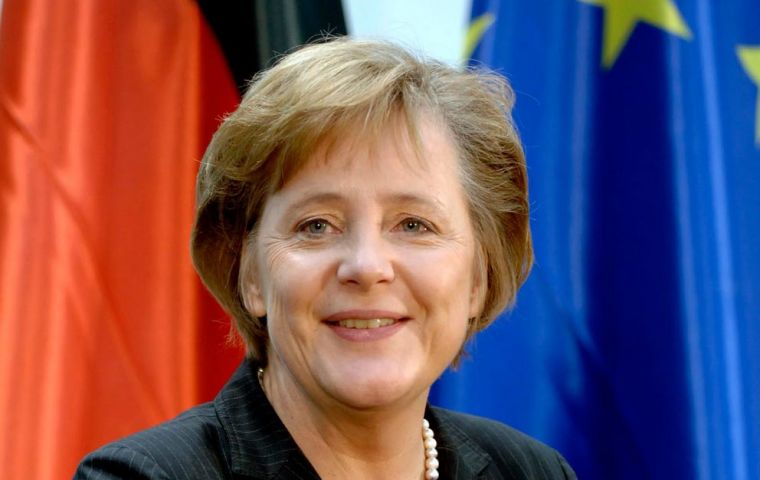MercoPress. South Atlantic News Agency
Potential candidates to succeed Strauss-Kahn as head of the IMF
 Germany’s Angela Merkel wants the job to remain in the hands of a European
Germany’s Angela Merkel wants the job to remain in the hands of a European Dominique Strauss-Kahn, (DSK) the head of the International Monetary Fund, may be forced to leave his post after being accused of trying to rape a maid in his New York hotel room. IMF is currently under John Lipsky Acting Managing Director.
A list of potential candidates to succeed DSK at the Washington-based institution if he does step down or is dismissed has surfaces although the post has traditionally gone to a European. Furthermore German Chancellor Angela Merkel said on Monday that she preferred another European at the helm of the IMF, which has become heavily involved in bailouts of struggling euro zone countries Greece, Ireland and Portugal.
The list includes Kemal Dervis from Turkey, the leading candidate for the IMF post if it goes to a non-European, Dervis is credited with bringing Turkey back from the brink after a disastrous 2001 financial crisis, by pushing through tough reforms and helping secure a multibillion dollar IMF bailout.
Turkey's status as a large emerging market within the European continent could ease widespread concerns by developing nations who feel shut out of the IMF selection process because of Europe's claim to the top job.
Dervis left Turkey to join the World Bank in 1978, becoming vice president of the institution in 1996. He returned home to much fanfare in 2001 as economy minister when Ankara faced failing banks, soaring inflation and massive currency devaluation.
If the post does end up going to a European, French Finance Minister Christine Lagarde, 55, looks like a top candidate and it would make her the first woman to head the institution.
A medal-winning member of France's synchronized swimming team as a teenager and the first female chairman of US law firm Baker MacKenzie, Lagarde won respect in the markets during the global financial crisis and helped promote France's negotiating clout in key forms like the Group of 20.
A flawless English speaker, Lagarde was voted best Finance minister in Europe by the Financial Times in 2009. However against her is her nationality. A Frenchman has run the IMF for 26 out of the last 33 years and the Strauss-Kahn embarrassment may make it difficult for Paris to argue that its run should continue.
Trevor Manuel, 55, is well-respected in global financial circles, having served as Finance minister of South Africa from 1996 to 2009. He has long been touted as a possible candidate for the IMF and the World Bank, although IMF insiders believe he would be best suited to the poverty-fighting World Bank.
Born in Cape Town under apartheid, Manuel was a founding member of the United Democratic Front and was imprisoned repeatedly by the South African government for political activities in the late 1980s. Initially sceptical, the investment community watched with approval as Manuel made a swift transition from blue-jeans activist to dark-suited minister in the 1990s.
Manuel's position in the cabinet was seen as crucial for foreign investors hoping for a stable transition after the ousting of President Thabo Mbeki in 2008.
Agustin Carstens, 52, has served most of his professional career as an economic policymaker in his home country, becoming governor of the Bank of Mexico in January last year after serving as the bank's chief economist.
His debut raised questions about the central bank's independence after Carstens pledged to work closely with the government and invited the finance minister to sit in on monetary policy discussions.
He had a successful stint as deputy managing director at the IMF from 2003 to 2006, before returning to Mexico to coordinate the economic policy program of President Felipe Calderon, later becoming Secretary of Finance. Carstens obtained a PhD in economics in 1985 from the University of Chicago, a haven for proponents of deregulation and laissez-faire economics.
Working against Carstens is the fact that he comes from the Americas. Robert Zoellick of the United States runs the World Bank and other countries may not be keen to see officials from the same part of the world running the two global institutions.
Finally there is Montek Singh Ahluwalia, 67, an influential economic adviser to Indian Prime Minister Manmohan Singh and has been a key figure in the country's economic reforms from the mid-1980s onward. He is a supporter of open markets, who has pushed the government to end fuel price controls and remove barriers to foreign business in his role as deputy chairman of the Planning Commission of India, a post he has held since 2004.
Before that Ahluwalia served as the first director of the IMF Independent Evaluation Office. He started his career in the World Bank, joining the Indian government as an economic adviser in the finance ministry in 1979.




Top Comments
Disclaimer & comment rulesCommenting for this story is now closed.
If you have a Facebook account, become a fan and comment on our Facebook Page!